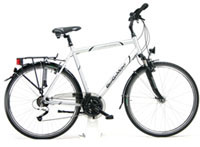Day 95-100: The perfect End
I left Chengdu for Beijing well-rested, ready for new impressions and experiences, but slightly concerned about flying with the bicycle domestically. However, no issues surfaced, although I was surprised not to arrive at Beijing’s international airport. Instead, the aircraft landed at an unusually small airfield, apparently in the vicinity of the larger airport. Immediately after I stepped off the plane, I spotted my bag and bicycle on the conveyer belt only meters from the aircraft. I grabbed my belongings and approached two other western travelers in hope of sharing a taxi to Beijing. An hour and a half later and plenty of negotiations, we were all dropped off in a narrow alley of crowding restaurants and hotels near the Tiananmen Square, in the heart of Beijing. As I checked in at the Far East hotel, I ran into Harel, a quiet Israeli gentleman I had met briefly in Lijiang. Although its exceptional size, China seems smaller when traveling, and I have often met the same people in various locations throughout the Yunnan and Sichuan province, but to reunite after almost a month in one of the largest cities of the world is very rare and almost frightening. We were placed in the same dormitory with four other backpackers in a nicely air-conditioned room for an astonishing 60 Yuan (6 Euros - more than double than any other dormitories I had stayed), and headed out for dinner. On our way we ran into another Swede, Carina, who was in China for her second time to explore more of the country. Together we went out for our evening meal to celebrate our first day in Beijing and share plans and ideas.
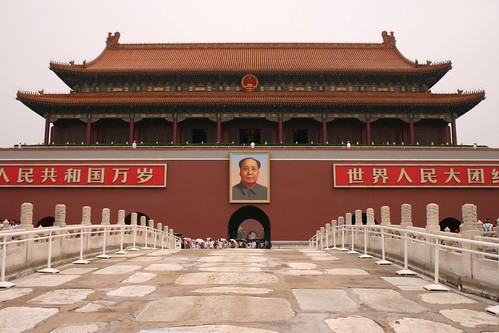 Beijing is an overwhelmingly large city where you can spend weeks sightseeing and touring in and around the capital. Its population of over 15 million people does not even begin to describe how huge it appears when walking the streets among thousands of other tourists. As a result, I felt a bit stressed over what parts to visit and explore. After consulting Carina, Harel and other travelers in Chengdu, I decided to focus on the Great Wall, Forbidden City, Summer Palace and a cycle tour around the metropolis, prioritizing the Great Wall since I had seen a great number of temples, monasteries and parks throughout Yunnan and Sichuan provinces already. Also, the Great Wall is probably one of the most famous, celebrated and spectacular sites of the world. In point of fact, the 5000-kilometer wall is visible from the moon, which speaks for itself. With all that being planned, I had a hefty schedule to live up to, thus early the next day I woke to rush out into the street, heading for the Forbidden City on my bicycle. Before I entered the holy site, I wandered around the adjoining Tiananmen Square. The Square is full of walking tourists, taking pictures and buying souvenirs. Amazingly, it is large enough to house them all, hence it never feels cramped. As a matter of fact, it is the largest public square in the world, making ‘Stortorget’ (eng. translation: Big Square) in my hometown appear minuscule. In every direction of the Square there are other famous sites – to the north the ‘Gate of Heavenly Peace’, which is the entrance to the Forbidden City, to the east – ‘Museum of Chinese History’, to the west – ‘The Great Hall of the People’. In the middle of the Square stands the ‘Monument to the People’s of Heroes’, surrounded by red and gold Chinese flags and guarding soldiers. Not surprisingly or unintentionally, it felt extraordinary communistic and propagandist. Nevertheless, the Tiananmen Square was impressive. After an hour, I crossed over the square to the north and entered the Forbidden City, once home to two dynasties of emperors and the largest and best-preserved groups of ancient buildings in China. The site is not so forbidden anymore as thousands of tourists crowd it everyday. Just to buy the ticket I spend half and hour queuing and later pushed my way through packs of Chinese tourists in matching outfits of different colors. There was the orange team, the blue team and it seemed as if the entire spectrum of colors were present. Just as I left a crowd of orange dressed children fascinated by me and my camera, I ran into a student from Beijing University. He took me to the gallery of the school and presented some remarkable art work. It way have been part of a huge tourist scam, but I enjoyed the gallery and his engagement, as well as his fascinating work, thus bought two traditional Chinese paintings from him. I continued to fight my way through the swarm of tourists for two more hours, having walked through most of the site. There were so many temples of various sizes and purposes that I forgot the name of most of them as I left the area, stopping for some dumplings on my way back to the bicycle. The Forbidden City, named so because it was off limits for 500 years, certainly is an impressive site, but the current restorations for the Olympics and great number of tourists made it a less astounding experience for me. Half the day had passed but I had yet another large site to conquer – the Summer Palace of Beijing. This immense park is located about 20 kilometers north of the city-center and is dotted with palace temples, gardens, pavilions and bridges around the Kunming Lake. Not having notably cycled for a few days since I pedaled to the Panda Breeding Base in Chengdu, I pushed on with full force and arrived quickly at the park in the early afternoon. I spent two hours in the Summer Palace, walking around temples, crossing bridges and finally taking a boat across the mirrored, clear lake. Unfortunately, clouds were hanging low over the park, resulting in small showers and obscured views. Just when I left the park, the clouds had become too heavy and released rain with full power. Wet and exhausted, I arrived at the hotel just before supper, and made plans for the evening with Harel and Carina.
Beijing is an overwhelmingly large city where you can spend weeks sightseeing and touring in and around the capital. Its population of over 15 million people does not even begin to describe how huge it appears when walking the streets among thousands of other tourists. As a result, I felt a bit stressed over what parts to visit and explore. After consulting Carina, Harel and other travelers in Chengdu, I decided to focus on the Great Wall, Forbidden City, Summer Palace and a cycle tour around the metropolis, prioritizing the Great Wall since I had seen a great number of temples, monasteries and parks throughout Yunnan and Sichuan provinces already. Also, the Great Wall is probably one of the most famous, celebrated and spectacular sites of the world. In point of fact, the 5000-kilometer wall is visible from the moon, which speaks for itself. With all that being planned, I had a hefty schedule to live up to, thus early the next day I woke to rush out into the street, heading for the Forbidden City on my bicycle. Before I entered the holy site, I wandered around the adjoining Tiananmen Square. The Square is full of walking tourists, taking pictures and buying souvenirs. Amazingly, it is large enough to house them all, hence it never feels cramped. As a matter of fact, it is the largest public square in the world, making ‘Stortorget’ (eng. translation: Big Square) in my hometown appear minuscule. In every direction of the Square there are other famous sites – to the north the ‘Gate of Heavenly Peace’, which is the entrance to the Forbidden City, to the east – ‘Museum of Chinese History’, to the west – ‘The Great Hall of the People’. In the middle of the Square stands the ‘Monument to the People’s of Heroes’, surrounded by red and gold Chinese flags and guarding soldiers. Not surprisingly or unintentionally, it felt extraordinary communistic and propagandist. Nevertheless, the Tiananmen Square was impressive. After an hour, I crossed over the square to the north and entered the Forbidden City, once home to two dynasties of emperors and the largest and best-preserved groups of ancient buildings in China. The site is not so forbidden anymore as thousands of tourists crowd it everyday. Just to buy the ticket I spend half and hour queuing and later pushed my way through packs of Chinese tourists in matching outfits of different colors. There was the orange team, the blue team and it seemed as if the entire spectrum of colors were present. Just as I left a crowd of orange dressed children fascinated by me and my camera, I ran into a student from Beijing University. He took me to the gallery of the school and presented some remarkable art work. It way have been part of a huge tourist scam, but I enjoyed the gallery and his engagement, as well as his fascinating work, thus bought two traditional Chinese paintings from him. I continued to fight my way through the swarm of tourists for two more hours, having walked through most of the site. There were so many temples of various sizes and purposes that I forgot the name of most of them as I left the area, stopping for some dumplings on my way back to the bicycle. The Forbidden City, named so because it was off limits for 500 years, certainly is an impressive site, but the current restorations for the Olympics and great number of tourists made it a less astounding experience for me. Half the day had passed but I had yet another large site to conquer – the Summer Palace of Beijing. This immense park is located about 20 kilometers north of the city-center and is dotted with palace temples, gardens, pavilions and bridges around the Kunming Lake. Not having notably cycled for a few days since I pedaled to the Panda Breeding Base in Chengdu, I pushed on with full force and arrived quickly at the park in the early afternoon. I spent two hours in the Summer Palace, walking around temples, crossing bridges and finally taking a boat across the mirrored, clear lake. Unfortunately, clouds were hanging low over the park, resulting in small showers and obscured views. Just when I left the park, the clouds had become too heavy and released rain with full power. Wet and exhausted, I arrived at the hotel just before supper, and made plans for the evening with Harel and Carina.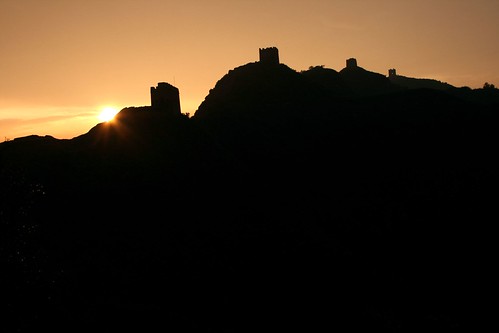 You can visit the Great Wall of China at many different locations. It stretches east-west, 5000 kilometers from its speckled remains in Liaoning province to the Gobi desert. Simply summarized, the closer you are to Beijing, the more tourists you will encounter, and the more restored the Wall might be. As a result, I wanted to get as far as I possible could from Beijing in order to visit the Wall in solitude, and be able to witness parts of the Wall unrestored. I had heard of the possibility to camp in one of the many towers consistently positioned every few hundred meter on the Wall. The idea quickly appealed to me and just as swiftly I convinced Harel to join me. With our sleeping bags and my one-person tent we headed for Jinshanling, about 110 kilometers north of Beijing to hike the Great Wall for 10 kilometers to Simatai, where we would climb the challenging last way up an extremely steep section of the Wall as far as tourist are allowed. On the way we planned to find an appropriate tower to camp in. After a subway ride, bus trip and an expensive taxi fare, we were finally in Jinshanling in the early afternoon, starting our hike towards Simatai. Before we could climb up on the Wall and get on our way, we had a few hundred meters to walk. Tensely, I paced the last meters up on the Wall, curious of what I was about to witness. Once there, the beauty and magnitude of it took me by surprise. Although I had seen several pictures of it and its colossal scale and length, I was still in chock of how enormous it appeared as it twisted its way over the mountain tops. The fact that human slaves had built this Wall with their bare hands was an unattainable thought. Amazed, we continued to walk east towards Simatai, up and down the Wall, always on the top of the mountain chain. The surrounding environment of layers of mountain peaks also stroke both me and Harel as exceptionally stunning. Clouds were softly floating between the mountains below us or creating a mystic, dramatic light above us. In front, the Wall swirled its way under our feet through the spectacular landscape. We walked slowly, stopping to take pictures, too often or too seldom, we could not tell. It all was too beautiful. After three hours the drizzling rain turned into a heavy downpour and we decided to stop for the day in the third tower from the tallest peak we had crossed during our 3-hour walk. We figured we were close to Simatai and would easily walk there the next morning after sunrise. The main reason I had desired to camp was to watch the sun set in the west behind the Wall, and rise over the mountains in the morning to the east. Unfortunately, as the rain continued to pour down and the wind grew stronger and stronger, my hope of seeing the sunset completely diminished. We settled down in the tower, Harel putting up his hammock, me pinching up my small tent, prepared our dinner of bananas, cookies and beer and gradually made ourselves comfortable. As we were sitting chewing on Chinese Oreo cookies, I saw an orange spot of light emerging on the stone wall behind Harel. Can it be true? I yelled out something incomprehensible, jumped up to run to get my camera, scaring Harel almost to death. The clouds had mysteriously cleared at the horizon, behind the Wall where the sun was slowly setting. The golden rays were so strong they filled the sky with a delightful orange color, leaving the Great Wall as a silhouette in the foreground. Not only did we get to experience the sunset over the Great Wall, but I also witnessed the most breathtaking sunset I had ever seen. Very satisfied and excited over our mutual experience we sat and talked until the sun had disappeared completely, only leaving room for darkness. Shortly we were both asleep. We woke up the next day to an even more stunning sunrise with soft clouds lingering in the valleys of the mountains. Again, the sun was casting golden rays, illuminating the sky in orange hues, the Wall barely visible in the morning hazy mist. The landscape took a dreamlike appearance I had never before experienced of endless layers of golden mountain peaks with translucent clouds hovering in between. Again, me and Hajal stood startled, orangey illuminated, and amazed by the beauty of nature and the Great Wall. As lightness emerged, we walk towards Simatai for about an hour until we reached a guesthouse which served us a very essential nutritious meal before we were about to tackled the steep climb of the Great Wall of Simatai. By now I had cycled over 3500 kilometer and completed few treks, thus, frankly, the climb was quite easy, although I had heard stories that told otherwise. At the top, where visitors where not allowed to proceed, we could see the Wall stretch as far as the eye could see. Now the day had fully arrived and the sky was clear and vivid blue with no clouds to obscure the view. Again, we took a few moments to try to grasp the magnitude of building the Wall, an undertaking which took 2000 years to complete, before we headed back down and walked the last kilometers to Simatai. The way back to Beijing was as complicated and tedious as our way to Jinshanling, but will not interfere with the memories of hiking the Great Wall – an experience I will never forget.
You can visit the Great Wall of China at many different locations. It stretches east-west, 5000 kilometers from its speckled remains in Liaoning province to the Gobi desert. Simply summarized, the closer you are to Beijing, the more tourists you will encounter, and the more restored the Wall might be. As a result, I wanted to get as far as I possible could from Beijing in order to visit the Wall in solitude, and be able to witness parts of the Wall unrestored. I had heard of the possibility to camp in one of the many towers consistently positioned every few hundred meter on the Wall. The idea quickly appealed to me and just as swiftly I convinced Harel to join me. With our sleeping bags and my one-person tent we headed for Jinshanling, about 110 kilometers north of Beijing to hike the Great Wall for 10 kilometers to Simatai, where we would climb the challenging last way up an extremely steep section of the Wall as far as tourist are allowed. On the way we planned to find an appropriate tower to camp in. After a subway ride, bus trip and an expensive taxi fare, we were finally in Jinshanling in the early afternoon, starting our hike towards Simatai. Before we could climb up on the Wall and get on our way, we had a few hundred meters to walk. Tensely, I paced the last meters up on the Wall, curious of what I was about to witness. Once there, the beauty and magnitude of it took me by surprise. Although I had seen several pictures of it and its colossal scale and length, I was still in chock of how enormous it appeared as it twisted its way over the mountain tops. The fact that human slaves had built this Wall with their bare hands was an unattainable thought. Amazed, we continued to walk east towards Simatai, up and down the Wall, always on the top of the mountain chain. The surrounding environment of layers of mountain peaks also stroke both me and Harel as exceptionally stunning. Clouds were softly floating between the mountains below us or creating a mystic, dramatic light above us. In front, the Wall swirled its way under our feet through the spectacular landscape. We walked slowly, stopping to take pictures, too often or too seldom, we could not tell. It all was too beautiful. After three hours the drizzling rain turned into a heavy downpour and we decided to stop for the day in the third tower from the tallest peak we had crossed during our 3-hour walk. We figured we were close to Simatai and would easily walk there the next morning after sunrise. The main reason I had desired to camp was to watch the sun set in the west behind the Wall, and rise over the mountains in the morning to the east. Unfortunately, as the rain continued to pour down and the wind grew stronger and stronger, my hope of seeing the sunset completely diminished. We settled down in the tower, Harel putting up his hammock, me pinching up my small tent, prepared our dinner of bananas, cookies and beer and gradually made ourselves comfortable. As we were sitting chewing on Chinese Oreo cookies, I saw an orange spot of light emerging on the stone wall behind Harel. Can it be true? I yelled out something incomprehensible, jumped up to run to get my camera, scaring Harel almost to death. The clouds had mysteriously cleared at the horizon, behind the Wall where the sun was slowly setting. The golden rays were so strong they filled the sky with a delightful orange color, leaving the Great Wall as a silhouette in the foreground. Not only did we get to experience the sunset over the Great Wall, but I also witnessed the most breathtaking sunset I had ever seen. Very satisfied and excited over our mutual experience we sat and talked until the sun had disappeared completely, only leaving room for darkness. Shortly we were both asleep. We woke up the next day to an even more stunning sunrise with soft clouds lingering in the valleys of the mountains. Again, the sun was casting golden rays, illuminating the sky in orange hues, the Wall barely visible in the morning hazy mist. The landscape took a dreamlike appearance I had never before experienced of endless layers of golden mountain peaks with translucent clouds hovering in between. Again, me and Hajal stood startled, orangey illuminated, and amazed by the beauty of nature and the Great Wall. As lightness emerged, we walk towards Simatai for about an hour until we reached a guesthouse which served us a very essential nutritious meal before we were about to tackled the steep climb of the Great Wall of Simatai. By now I had cycled over 3500 kilometer and completed few treks, thus, frankly, the climb was quite easy, although I had heard stories that told otherwise. At the top, where visitors where not allowed to proceed, we could see the Wall stretch as far as the eye could see. Now the day had fully arrived and the sky was clear and vivid blue with no clouds to obscure the view. Again, we took a few moments to try to grasp the magnitude of building the Wall, an undertaking which took 2000 years to complete, before we headed back down and walked the last kilometers to Simatai. The way back to Beijing was as complicated and tedious as our way to Jinshanling, but will not interfere with the memories of hiking the Great Wall – an experience I will never forget. 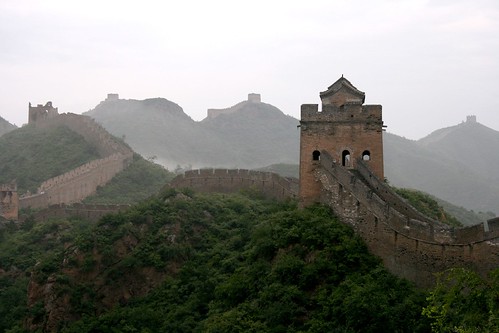 Both me and Harel agreed that a hike of that enormity deserved unrestricted celebrations, thus we met up with friends to share some Chinese rice liquor and beer. A new friend that I had met in Chengdu, Tim, joined us for the party. Tim added greatly to the celebrations with his stories of life in the state of Lousiana in the U.S. and surviving Hurricane Katrina, as well running a few businesses, practicing a rare kind of martial art, speaking several languages, and traveling, all while smiling and spreading positive energy around him. This 23-year old man had enough stories to fill the entire evening with laughter and excitement. Tim is a charming and intellectual character that you do not meet often in life. Be prepared, though, to listen more than speaking. My last day of my journey consisted of treating a hangover, shopping, packing and again, dissembling the bicycle for the plane ride. The day was quickly over and at the end of it I was sitting with ten other travelers, some older friends, some new acquaintances, around a big wooden table in a typical Chinese courtyard with red lanterns lighting up the patio, drinking local beer for 2 Yuan (0,2 Euros) a bottle, trying to grasp that my journey was over. People were singing, playing guitar, making jokes, sharing travel stories and laughing as if time stood still. As the evening progressed I thought more and more about my experiences over the last 100 days. It seemed as if I had been traveling for an eternity and my experiences felt infinite. Everyday I had been presented new experiences that would last in my memories for years to come, some as long as I will live. I felt as if the last 100 days had extended my life with 100 months, having encountered countless unique and new situations. From every experience I learned something valuable, something new about the world that would broaden my knowledge and perspective of life. I realized how easy it is to get trapped in the routine of life and lock yourself to one way of thinking, forgetting that the world is greater than your backyard. Nevertheless, life is also about routine and familiarity, which leads to close friends, relationships and family. With that thought I retired to bed, not only extremely pleased with my travels, but excited to get home to family, friends and my girlfriend.
Both me and Harel agreed that a hike of that enormity deserved unrestricted celebrations, thus we met up with friends to share some Chinese rice liquor and beer. A new friend that I had met in Chengdu, Tim, joined us for the party. Tim added greatly to the celebrations with his stories of life in the state of Lousiana in the U.S. and surviving Hurricane Katrina, as well running a few businesses, practicing a rare kind of martial art, speaking several languages, and traveling, all while smiling and spreading positive energy around him. This 23-year old man had enough stories to fill the entire evening with laughter and excitement. Tim is a charming and intellectual character that you do not meet often in life. Be prepared, though, to listen more than speaking. My last day of my journey consisted of treating a hangover, shopping, packing and again, dissembling the bicycle for the plane ride. The day was quickly over and at the end of it I was sitting with ten other travelers, some older friends, some new acquaintances, around a big wooden table in a typical Chinese courtyard with red lanterns lighting up the patio, drinking local beer for 2 Yuan (0,2 Euros) a bottle, trying to grasp that my journey was over. People were singing, playing guitar, making jokes, sharing travel stories and laughing as if time stood still. As the evening progressed I thought more and more about my experiences over the last 100 days. It seemed as if I had been traveling for an eternity and my experiences felt infinite. Everyday I had been presented new experiences that would last in my memories for years to come, some as long as I will live. I felt as if the last 100 days had extended my life with 100 months, having encountered countless unique and new situations. From every experience I learned something valuable, something new about the world that would broaden my knowledge and perspective of life. I realized how easy it is to get trapped in the routine of life and lock yourself to one way of thinking, forgetting that the world is greater than your backyard. Nevertheless, life is also about routine and familiarity, which leads to close friends, relationships and family. With that thought I retired to bed, not only extremely pleased with my travels, but excited to get home to family, friends and my girlfriend.SLIDESHOW BEIJING & THE GREAT WALL

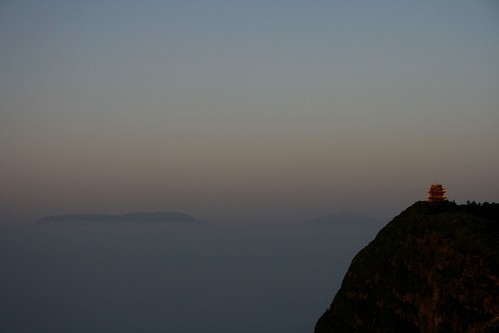 After two weeks of cycling more then 1000 kilometers, and few resting days, I was reluctant to climb the thousands of steps leading up to the summit of Mount Emei. Also, the monotony of walking up stairs did not appeal to me, thus I decided to take a bus up to 2500 meters elevation, walk two hours, climbing the most evil part of the stairs, find a place to stay and rise early the following morning to catch the sun breaking the day over soft layers of clouds at 3099 meters above sea level. As a result, on my second afternoon in Baoguo village, I caught a bus with the party of Chinese tourists in matching clothes, hats and flags. The bus wove its way up the steep road, a very familiar sight, but now I was comfortable seated on an air-conditioned bus opposed to pedaling up the mountain. After two hours the bus stopped and all passengers rushed to pull their jackets out of their bags and cover themselves in the chilling temperatures of 2500 meters elevation. The quick ascend made me slightly lightheaded and caused a mild headache. Nevertheless, the two hours passed quickly as I marched my way up the concrete stairs through the forest, monasteries and temples. By the time I found a small house along the path that could serve me my last meal of the day and provide shelter, it was after seven o'clock. After dinner I retired to bed early to prepare for a two-hour walk at the crack of dawn. The cramped room felt primitively simple, just large enough to house a bed and a TV, with an external door that would not shut or lock, adding to the uncivilized experience. Ironically, for the first time since entering China, the TV displayed a perfect digital picture and provided numerous channels, including a few English speaking alternatives. The odd mixture of old and new was shortly lived when my alarm clock buzzed quarter past four, three hours before sunrise, making my entire body shudder in disapproval. Slowly I made my way out the door, stepping into the dark, silent forest. Immediately, I was startled by the open, clear night sky, dotted with billions of brilliant stars, visible through the tree tops. Never before have I witnessed such a bright, vivid and clear starry sky. Breathless, I stood paralyzed by its beauty and scale until my balance lost orientation. I advanced up the stairs into the darkness of the forest, the beam of my head-flashlight leading the way. After an hour and a half I reached the summit. To my surprise, I was alone, wandering through the temple grounds in complete obscurity and silence. The stillness was interrupted as I climbed the last stairs to the Golden Summit as other hikers made their entrance. At the edge of the cliff, looking out over the dark clouds, I stood for an hour and a half as lightness emerged, watching and hearing hundreds of Chinese tourists entering the famous site. It is widely recognized that Chinese people constantly, openly and loudly clear their throats, spitting whenever and wherever possible. The phenomenon is especially noticeable in the first hours of the day. Adding the early morning exercise does not exactly relieve their eccentric habit. One after one they came climbing the final stairs, panting and wheezing. The constant noise soon transformed into an orchestra of hawking and spitting in various tones. It truly was disgusting. When the sun made its entrance, all sounds came to a stop, and every visitor stood in awe, watching the sun rise over the sea of clouds, turning the sky into a rich orange and yellow color. The entire temple site was illuminated in golden hue. To the west, the Gonga Mountains appeared in the far distance as the sun continued to rise. The 7500 meter glacier peaks are rarely visible, even on the clearest day, perfecting my visit to the Golden Summit of Mount Emei.
After two weeks of cycling more then 1000 kilometers, and few resting days, I was reluctant to climb the thousands of steps leading up to the summit of Mount Emei. Also, the monotony of walking up stairs did not appeal to me, thus I decided to take a bus up to 2500 meters elevation, walk two hours, climbing the most evil part of the stairs, find a place to stay and rise early the following morning to catch the sun breaking the day over soft layers of clouds at 3099 meters above sea level. As a result, on my second afternoon in Baoguo village, I caught a bus with the party of Chinese tourists in matching clothes, hats and flags. The bus wove its way up the steep road, a very familiar sight, but now I was comfortable seated on an air-conditioned bus opposed to pedaling up the mountain. After two hours the bus stopped and all passengers rushed to pull their jackets out of their bags and cover themselves in the chilling temperatures of 2500 meters elevation. The quick ascend made me slightly lightheaded and caused a mild headache. Nevertheless, the two hours passed quickly as I marched my way up the concrete stairs through the forest, monasteries and temples. By the time I found a small house along the path that could serve me my last meal of the day and provide shelter, it was after seven o'clock. After dinner I retired to bed early to prepare for a two-hour walk at the crack of dawn. The cramped room felt primitively simple, just large enough to house a bed and a TV, with an external door that would not shut or lock, adding to the uncivilized experience. Ironically, for the first time since entering China, the TV displayed a perfect digital picture and provided numerous channels, including a few English speaking alternatives. The odd mixture of old and new was shortly lived when my alarm clock buzzed quarter past four, three hours before sunrise, making my entire body shudder in disapproval. Slowly I made my way out the door, stepping into the dark, silent forest. Immediately, I was startled by the open, clear night sky, dotted with billions of brilliant stars, visible through the tree tops. Never before have I witnessed such a bright, vivid and clear starry sky. Breathless, I stood paralyzed by its beauty and scale until my balance lost orientation. I advanced up the stairs into the darkness of the forest, the beam of my head-flashlight leading the way. After an hour and a half I reached the summit. To my surprise, I was alone, wandering through the temple grounds in complete obscurity and silence. The stillness was interrupted as I climbed the last stairs to the Golden Summit as other hikers made their entrance. At the edge of the cliff, looking out over the dark clouds, I stood for an hour and a half as lightness emerged, watching and hearing hundreds of Chinese tourists entering the famous site. It is widely recognized that Chinese people constantly, openly and loudly clear their throats, spitting whenever and wherever possible. The phenomenon is especially noticeable in the first hours of the day. Adding the early morning exercise does not exactly relieve their eccentric habit. One after one they came climbing the final stairs, panting and wheezing. The constant noise soon transformed into an orchestra of hawking and spitting in various tones. It truly was disgusting. When the sun made its entrance, all sounds came to a stop, and every visitor stood in awe, watching the sun rise over the sea of clouds, turning the sky into a rich orange and yellow color. The entire temple site was illuminated in golden hue. To the west, the Gonga Mountains appeared in the far distance as the sun continued to rise. The 7500 meter glacier peaks are rarely visible, even on the clearest day, perfecting my visit to the Golden Summit of Mount Emei.  Climbing down stairs from an elevation of 3099 meters to approximately 500, I highly underestimated. It required stepping down thousands and thousands of tedious steps. Fortunately, I found company at the top. A British traveler, named Damien, had actually climbed the entire way up, and was determined to step all the way down as well. Together we started marching down step by step after the sun had risen over the Summit. Just before lunch an appearance of a group of Baboons broke the monotonous stride. They are known to linger the area in hope of finding or stealing food from passing humans. Their large size and sharp, long teeth are slightly frightening. Excited, we quickly pulled out our cameras, squatted to get a better camera perspective, but before I had time to press the exposure button, a large male Baboon ran towards Damien at an alarming pace. As Damien instantly stood up, the Baboon reached down into his right pocket, trying to grab a package of biscuits that had popped out when Damien bent down to take a picture. Frantically, the Baboon was trying to grab the food, pulling and jerking Damien’s shorts. When he reached down to stop the fearless monkey, it snapped at him, hit his hand and displayed its vicious teeth. Seconds later the Baboon was eating what was left of the crumbled biscuits, not willing to share any with the rest of its fellow Baboons. It seems that the monkeys of Mount Emei would do anything to fill their stomachs. During lunch, as we started to alleviate our hunger, another brave monkey entered the restaurant. It jumped up onto the table behind us where a woven rise bowl was place, tore the top lid off and desperately began to stuff rise into its mouth. I stood up, shouted and chased the Baboon out of the restaurant, laughing at the exceptionally awkward scenario. The Baboons, not the walk down the mountain, had made my day.
Climbing down stairs from an elevation of 3099 meters to approximately 500, I highly underestimated. It required stepping down thousands and thousands of tedious steps. Fortunately, I found company at the top. A British traveler, named Damien, had actually climbed the entire way up, and was determined to step all the way down as well. Together we started marching down step by step after the sun had risen over the Summit. Just before lunch an appearance of a group of Baboons broke the monotonous stride. They are known to linger the area in hope of finding or stealing food from passing humans. Their large size and sharp, long teeth are slightly frightening. Excited, we quickly pulled out our cameras, squatted to get a better camera perspective, but before I had time to press the exposure button, a large male Baboon ran towards Damien at an alarming pace. As Damien instantly stood up, the Baboon reached down into his right pocket, trying to grab a package of biscuits that had popped out when Damien bent down to take a picture. Frantically, the Baboon was trying to grab the food, pulling and jerking Damien’s shorts. When he reached down to stop the fearless monkey, it snapped at him, hit his hand and displayed its vicious teeth. Seconds later the Baboon was eating what was left of the crumbled biscuits, not willing to share any with the rest of its fellow Baboons. It seems that the monkeys of Mount Emei would do anything to fill their stomachs. During lunch, as we started to alleviate our hunger, another brave monkey entered the restaurant. It jumped up onto the table behind us where a woven rise bowl was place, tore the top lid off and desperately began to stuff rise into its mouth. I stood up, shouted and chased the Baboon out of the restaurant, laughing at the exceptionally awkward scenario. The Baboons, not the walk down the mountain, had made my day. Chengdu is the capital city of the Sichuan province. With close to five million inhabitants it is a large, modern, commercial city of clustered high-rise buildings, busy streets and loads of western influences. McDonalds, Starbucks, Pizza Hut and several western well-known clothing brands are present in every large department store. Still, the city offers a taste of Sichuan culture and history, and one can easily find small, lively streets and markets where men and women sell various traditional foods and goods. I had several days in Chengdu to rest, relax, run errands and sightsee. There are many attractions and places to visit in and around the city. I started with handling most of my errands, such as pick up my flight ticket to Beijing and exchange money. Secondly, I cycled around the capital to get an overview of the central metropolis and experience the atmosphere. I visited the famous Wenshu temple, Chengdu's most well-preserved and largest Buddhist temple. Its tea garden made a perfect place to update my journal, read and observe monks in their daily life. When my bum had had a couple of days of rest, I cycled to the Giant Panda Breeding Research Base, 15 kilometers north of the city. Here, about 50 Pandas are housed and the site is world-known for excellence in panda research, breeding and nursing. The park is also the largest in the world of its kind. It reminded me of a big, standard zoo, but only consisting of pandas. Walking through the park, seeing tens of pandas sleeping or eating (that is all they do) was exhilarating. Never before have I been so close to these endangered animals. Despite their large size, they are overwhelmingly adorable. Their movements are slow and childlike, fumbling as they stuff themselves with heaps of bamboo; their main source of food. Often they strike an awkward, charming pose as if they know how to get the crowds of tourists to fumble with their cameras, trying to seize the moment. I continued to visit various sites of the city, some interesting, some dull and ordinary. Despite my active engagement of the city, I have had plenty of time to hang around the guesthouse, doing nothing, reading, watching movies or speaking to other travelers, sharing experiences and stories. I have slept more than usual, a sign of relaxation and relief. The massage parlor across the street, offering a professional full-body rub down for 20 Yuan (2 Euros), might play a small role to my peaceful state of mind. My last day in Chengdu will be uneventful but for packing and the tedious process of dissembling my bicycle, preparing it for the plane ride. In a couple of days I will arrive in Beijing to enjoy my last days of my journey.
Chengdu is the capital city of the Sichuan province. With close to five million inhabitants it is a large, modern, commercial city of clustered high-rise buildings, busy streets and loads of western influences. McDonalds, Starbucks, Pizza Hut and several western well-known clothing brands are present in every large department store. Still, the city offers a taste of Sichuan culture and history, and one can easily find small, lively streets and markets where men and women sell various traditional foods and goods. I had several days in Chengdu to rest, relax, run errands and sightsee. There are many attractions and places to visit in and around the city. I started with handling most of my errands, such as pick up my flight ticket to Beijing and exchange money. Secondly, I cycled around the capital to get an overview of the central metropolis and experience the atmosphere. I visited the famous Wenshu temple, Chengdu's most well-preserved and largest Buddhist temple. Its tea garden made a perfect place to update my journal, read and observe monks in their daily life. When my bum had had a couple of days of rest, I cycled to the Giant Panda Breeding Research Base, 15 kilometers north of the city. Here, about 50 Pandas are housed and the site is world-known for excellence in panda research, breeding and nursing. The park is also the largest in the world of its kind. It reminded me of a big, standard zoo, but only consisting of pandas. Walking through the park, seeing tens of pandas sleeping or eating (that is all they do) was exhilarating. Never before have I been so close to these endangered animals. Despite their large size, they are overwhelmingly adorable. Their movements are slow and childlike, fumbling as they stuff themselves with heaps of bamboo; their main source of food. Often they strike an awkward, charming pose as if they know how to get the crowds of tourists to fumble with their cameras, trying to seize the moment. I continued to visit various sites of the city, some interesting, some dull and ordinary. Despite my active engagement of the city, I have had plenty of time to hang around the guesthouse, doing nothing, reading, watching movies or speaking to other travelers, sharing experiences and stories. I have slept more than usual, a sign of relaxation and relief. The massage parlor across the street, offering a professional full-body rub down for 20 Yuan (2 Euros), might play a small role to my peaceful state of mind. My last day in Chengdu will be uneventful but for packing and the tedious process of dissembling my bicycle, preparing it for the plane ride. In a couple of days I will arrive in Beijing to enjoy my last days of my journey.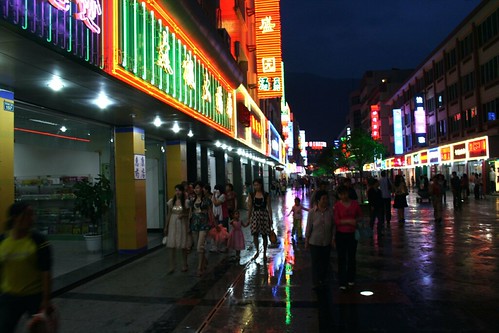
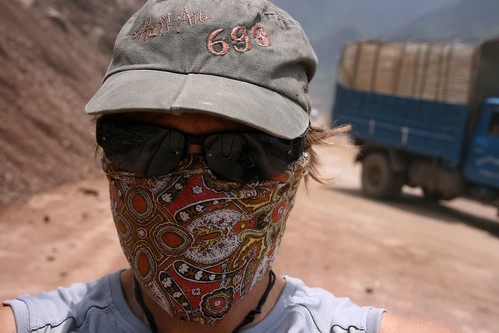
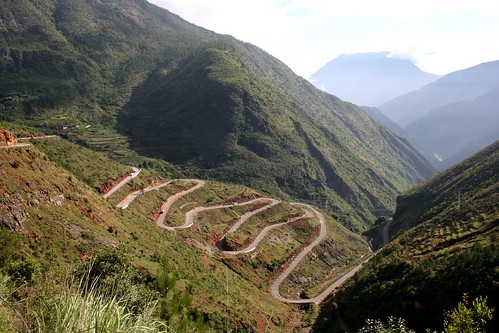 Initially, I had planned three days of cycling in order to reach the beautiful, scenic Lugu Lake, but a new road through the Mian Mian mountains would save me a day. I jumped on the opportunity, although I knew that crossing the mountain chain would be very demanding as well as a long ride, probably more than 120 kilometers. However, after two full days of leisure and relaxation I was ready for more physical challenges and set off towards Ninglang. The day started perfectly; the sun was shining, warming my skin in the cool, breezy wind, and I was pedaling effortless for the first 20 kilometers. To my delight the road also angled downward, making the first 40 kilometers a true cycling pleasure. However, despite my excitement of free-wheeling I was troubled due to the fact that I knew I still had to climb the Mian Mian mountains. Descending would only force me to climb even higher later in the day. I managed to ignore my anguish as I rolled all the way down to the river at the bottom of the mountain. After a tasty lunch by the river I curiously pedaled on, unaware of the coming obstacles. When the road started to slant upward I accepted the conditions and changed to the lowest gears, nevertheless, worried about how long the ascending would last. My concerns dramatically increased when the dreaded cobbled stones returned once again to make my life a living hell. At 80 kilometers the road was still angled in my disfavor, and the cobbled, rocky road very present. After 40 kilometers pedaling uphill on a road built to destroy bicycles, I stopped by a farmer's house to ask for food and water in lack of better options. He gladly invited my to his mudbrick house, and instructed his wife to get the fire started and cook me a meal, which would only consist of fried bread. As I sat there on a tiny stool in front of the fire, wobbling on the uneven dirt floor, I could hardly believe people could live under such poor and filthy conditions. They had no electricity and the only running water was from a rusty pump in front of the house. The farmer, his wife and father all had not washed in days and everything around me was covered in filth. Still, when preparing my meal the wife carefully washed all utilities in front of me as if she was very aware of their dirty home. Despite their poor living conditions they displayed great hospitality and even refused to accept money for the bread and green tea. According to the farmer I had another 20 kilometers until the road would finally turn downhill. I hoped he would be wrong, but as I found out fighting my way up the road over sharp stones, he was unfortunately right. After 60 kilometers uphill I had already claimed this the toughest, most demanding day of my journey, not including the additional bumpy way down to Ninglang. When I finally arrived after 125 kilometers, eight and a half hours of cycling, and more than twelve hours on the road it was almost eight o'clock. After dinner and a shower I could not even remembering falling asleep before I woke up the next morning, scheduled to cycle to Lugu Lake.
Initially, I had planned three days of cycling in order to reach the beautiful, scenic Lugu Lake, but a new road through the Mian Mian mountains would save me a day. I jumped on the opportunity, although I knew that crossing the mountain chain would be very demanding as well as a long ride, probably more than 120 kilometers. However, after two full days of leisure and relaxation I was ready for more physical challenges and set off towards Ninglang. The day started perfectly; the sun was shining, warming my skin in the cool, breezy wind, and I was pedaling effortless for the first 20 kilometers. To my delight the road also angled downward, making the first 40 kilometers a true cycling pleasure. However, despite my excitement of free-wheeling I was troubled due to the fact that I knew I still had to climb the Mian Mian mountains. Descending would only force me to climb even higher later in the day. I managed to ignore my anguish as I rolled all the way down to the river at the bottom of the mountain. After a tasty lunch by the river I curiously pedaled on, unaware of the coming obstacles. When the road started to slant upward I accepted the conditions and changed to the lowest gears, nevertheless, worried about how long the ascending would last. My concerns dramatically increased when the dreaded cobbled stones returned once again to make my life a living hell. At 80 kilometers the road was still angled in my disfavor, and the cobbled, rocky road very present. After 40 kilometers pedaling uphill on a road built to destroy bicycles, I stopped by a farmer's house to ask for food and water in lack of better options. He gladly invited my to his mudbrick house, and instructed his wife to get the fire started and cook me a meal, which would only consist of fried bread. As I sat there on a tiny stool in front of the fire, wobbling on the uneven dirt floor, I could hardly believe people could live under such poor and filthy conditions. They had no electricity and the only running water was from a rusty pump in front of the house. The farmer, his wife and father all had not washed in days and everything around me was covered in filth. Still, when preparing my meal the wife carefully washed all utilities in front of me as if she was very aware of their dirty home. Despite their poor living conditions they displayed great hospitality and even refused to accept money for the bread and green tea. According to the farmer I had another 20 kilometers until the road would finally turn downhill. I hoped he would be wrong, but as I found out fighting my way up the road over sharp stones, he was unfortunately right. After 60 kilometers uphill I had already claimed this the toughest, most demanding day of my journey, not including the additional bumpy way down to Ninglang. When I finally arrived after 125 kilometers, eight and a half hours of cycling, and more than twelve hours on the road it was almost eight o'clock. After dinner and a shower I could not even remembering falling asleep before I woke up the next morning, scheduled to cycle to Lugu Lake. 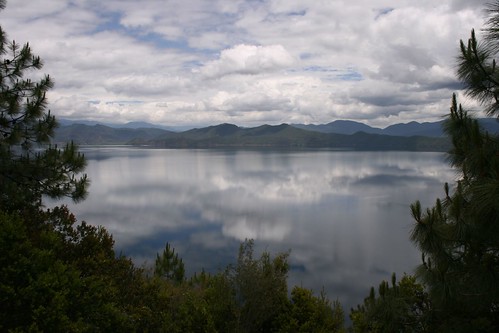 Lugu Lake (Lugu Hu) is located northeast of Lijiang at the Yunnan - Sichuan province border almost 2700 meters above sea level. The beautiful lake with its stunning surrounding scenery makes it a worthwhile stop, although cycling there means climbing mountains above 3000 meters elevation. After a sturdy breakfast I was ready to tackle the slanting roads once again and hoped that this day was not going to be as brutal as the previous. I was wrong. The steep, cobbled road continued to stretch my physical abilities to the limit, and tortured me for 73 kilometers all the way to Luoshui, a small town bordering the lake. Several times during the day I was forced to walk uphill when my legs surrendered, or I had to jump off the bicycle, leaving room on the narrow road for tourist buses on their way to Lugu Lake. At times I was tempted to wave down a bus and join the other Chinese tourists who so empathetically stared at me from their soft seats on the air-conditioned transporters. Just before I arrived, a heavy rainstorm made sure to make this yet another unforgettable day. I rushed to find a cozy hotel built in traditional wooden Chinese style at the edge of the lake. The room had a huge panorama window facing the reflecting water, and for 30 Yuan (3 Euro) it was mine for two days. Amazingly, after a hot shower, all pains and sorrows of the day were quickly forgotten as I layed down on the soft, clean sheets of the bed, looking out through the panorama window over the lake. A sudden feeling of tranquility spread through my body.
Lugu Lake (Lugu Hu) is located northeast of Lijiang at the Yunnan - Sichuan province border almost 2700 meters above sea level. The beautiful lake with its stunning surrounding scenery makes it a worthwhile stop, although cycling there means climbing mountains above 3000 meters elevation. After a sturdy breakfast I was ready to tackle the slanting roads once again and hoped that this day was not going to be as brutal as the previous. I was wrong. The steep, cobbled road continued to stretch my physical abilities to the limit, and tortured me for 73 kilometers all the way to Luoshui, a small town bordering the lake. Several times during the day I was forced to walk uphill when my legs surrendered, or I had to jump off the bicycle, leaving room on the narrow road for tourist buses on their way to Lugu Lake. At times I was tempted to wave down a bus and join the other Chinese tourists who so empathetically stared at me from their soft seats on the air-conditioned transporters. Just before I arrived, a heavy rainstorm made sure to make this yet another unforgettable day. I rushed to find a cozy hotel built in traditional wooden Chinese style at the edge of the lake. The room had a huge panorama window facing the reflecting water, and for 30 Yuan (3 Euro) it was mine for two days. Amazingly, after a hot shower, all pains and sorrows of the day were quickly forgotten as I layed down on the soft, clean sheets of the bed, looking out through the panorama window over the lake. A sudden feeling of tranquility spread through my body.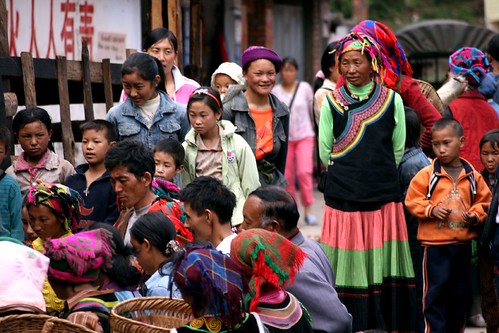 The last stretch towards Xichang ended up measuring 90 kilometers, adding up to almost 500 kilometers since I left Lijiang eight days ago. It too, presented challenging mountain passes and rough roads. However, the heat took me by surprise and left me without water for one hour climbing a 30 kilometers pass, also making it an unexceptionally demanding day of cycling. Again I was stared at, worshipped, and treated like a king whenever I stopped to eat or buy liquids. At lunch I was served by three women, constantly filling up my tea cup, adding rice to my bowl and making sure all was in order. When I left them behind for the last kilometers to Xichang, the whole family gathered to wave me goodbye. Xichang is a large, modern city on the rise with emerging large concrete buildings popping up at the edge of the city. It has a pulse of a modern metropolis and I am truly happy to be here. After having checked in at the hotel, I headed to Grandma's kitchen, a modern restaurant Christina had recommended back in Yanyuan. The name is misleading for the restaurant looks nothing like your grandmother's kitchen. It is a sofisticated place with matching furniture, decorative cloths and contemporary paintings on the walls. The 42" flat screen just adds to the modern impression. I spent the evening right there, in front of the TV, watching the NBA finals, eating an enormous hamburger with fries, peanut pecan pie and drinking diet coke and Cafe Americano. God bless, America.
The last stretch towards Xichang ended up measuring 90 kilometers, adding up to almost 500 kilometers since I left Lijiang eight days ago. It too, presented challenging mountain passes and rough roads. However, the heat took me by surprise and left me without water for one hour climbing a 30 kilometers pass, also making it an unexceptionally demanding day of cycling. Again I was stared at, worshipped, and treated like a king whenever I stopped to eat or buy liquids. At lunch I was served by three women, constantly filling up my tea cup, adding rice to my bowl and making sure all was in order. When I left them behind for the last kilometers to Xichang, the whole family gathered to wave me goodbye. Xichang is a large, modern city on the rise with emerging large concrete buildings popping up at the edge of the city. It has a pulse of a modern metropolis and I am truly happy to be here. After having checked in at the hotel, I headed to Grandma's kitchen, a modern restaurant Christina had recommended back in Yanyuan. The name is misleading for the restaurant looks nothing like your grandmother's kitchen. It is a sofisticated place with matching furniture, decorative cloths and contemporary paintings on the walls. The 42" flat screen just adds to the modern impression. I spent the evening right there, in front of the TV, watching the NBA finals, eating an enormous hamburger with fries, peanut pecan pie and drinking diet coke and Cafe Americano. God bless, America.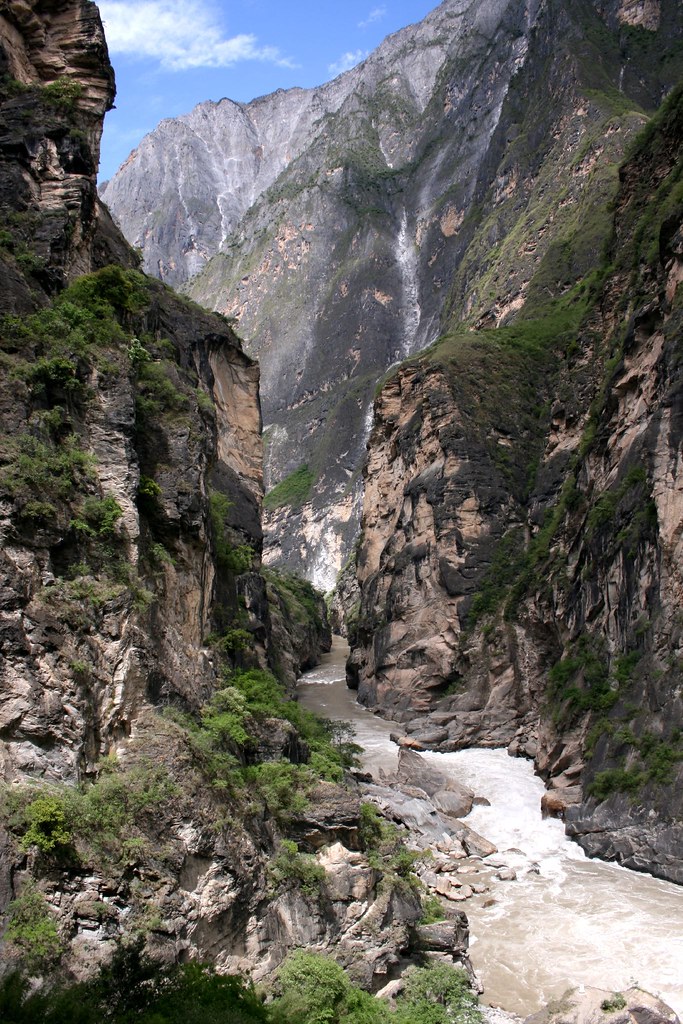
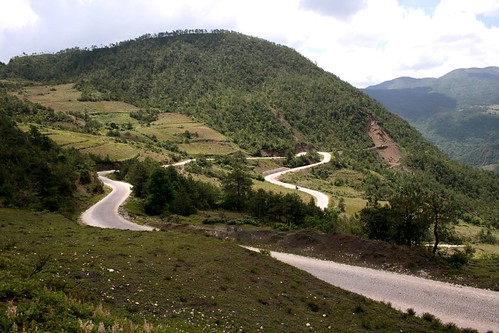
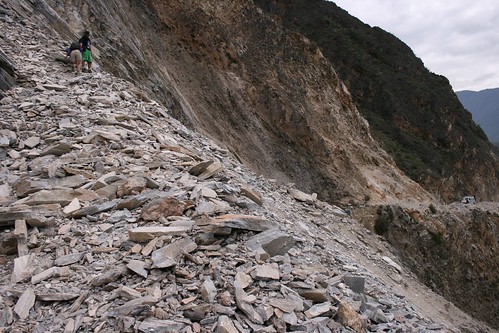 Before I reached Qiaotou I had conquer three more landslides, fortunately not of the scale of the first, and I had cycled almost 50 kilometers, 20 more that I expected. It was now past three o'clock and the Dutch fellows had already left for the first stop of the trek. I was complementing heading into the mountain or waiting to start the hike the following day. Being exhausted mentally as well as physically I decided to wait as I met a friendly couple staying next to me at the guesthouse. I quickly invited myself to join them the next day and they gladly accepted. The lovely couple, Dave and Jess, turned out to be very easy-going, friendly, inspiring people, and the perfect couple to share the Tiger Leaping Gorge with. On the two days it took to stride through it I saw more scenic mountain views than I probably have ever seen in my entire life traveling. When the clouds cleared we could see the top of Jade Dragon Snow Mountain and its glaciers glistering in the sun at about 5500 meters elevation. At the same time we could look down 2500 meters to witness the force of the mighty Jinsha River as it surges through the gorge. The trail winds its way up and down the mountain side, at times physically challenging, but more often simply enjoyable. Along the way we met other hikers just as awed by the scenery, creating a magical atmosphere. We spend two nights in the gorge, looking out over the gigantic, impressive peaks, eating, drinking, talking and laughing, until we retired to our beds. Tiger Leaping Gorge was an unforgettable adventure.
Before I reached Qiaotou I had conquer three more landslides, fortunately not of the scale of the first, and I had cycled almost 50 kilometers, 20 more that I expected. It was now past three o'clock and the Dutch fellows had already left for the first stop of the trek. I was complementing heading into the mountain or waiting to start the hike the following day. Being exhausted mentally as well as physically I decided to wait as I met a friendly couple staying next to me at the guesthouse. I quickly invited myself to join them the next day and they gladly accepted. The lovely couple, Dave and Jess, turned out to be very easy-going, friendly, inspiring people, and the perfect couple to share the Tiger Leaping Gorge with. On the two days it took to stride through it I saw more scenic mountain views than I probably have ever seen in my entire life traveling. When the clouds cleared we could see the top of Jade Dragon Snow Mountain and its glaciers glistering in the sun at about 5500 meters elevation. At the same time we could look down 2500 meters to witness the force of the mighty Jinsha River as it surges through the gorge. The trail winds its way up and down the mountain side, at times physically challenging, but more often simply enjoyable. Along the way we met other hikers just as awed by the scenery, creating a magical atmosphere. We spend two nights in the gorge, looking out over the gigantic, impressive peaks, eating, drinking, talking and laughing, until we retired to our beds. Tiger Leaping Gorge was an unforgettable adventure.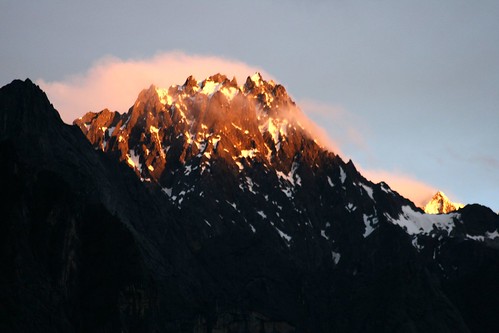
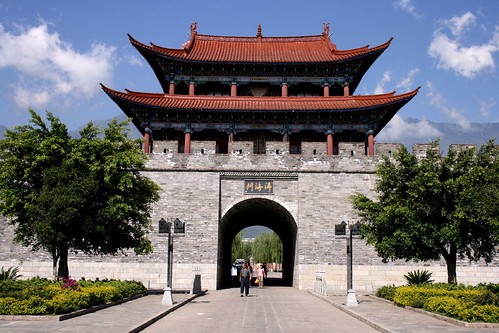 There is not much to do in Dali but to wonder around the pleasant streets and alleys and absorb the atmosphere, drink, eat and relax. However, I and the two Swedish girls agreed to go on a short boat tour on the lake, and I did my own cycle tour around town to familiarize myself with the surroundings and the local people. I had three full days of rest in Dali and when the fourth morning arrived I was excited to get back on the road. I left early to catch the morning mist and fresh air. Cycling out of Dali was majestic. The sun had just appeared over the mountains to the east, illuminating the Erhai Lu Lake and castings its rays on the peaks to the west. In the perfect moment when I was cruising at my average comfortable speed, the fresh morning air softly striking my face, I heard a sudden noise from the back of my bicycle. I stopped to see that my rear rack had loosened and was pressing against the rear wheel. At first I was troubled, but soon realized that all the bolts had just come off due to the bumpy roads towards Dali. They simply had been shaken loose and I had forgotten to tighten them. Luckily only one bolt was missing and I was able to replace it easily to continue to enjoy this extraordinary morning. I expected a mountain pass to arrive sometime during the day and at 45 kilometers my anticipation was confirmed. I fought my way up the steep road for 20 kilometers until I finally reached Beija, my intended destination for the day. However, Beija was not only far from the road, it is located a few hundred meters below the road, making it difficult to reach. Again I trusted my anticipation and continued pedaling, hoping the road was going to turn downhill shortly. Half an hour later I was in the next town, Songgui, having rolled down the mountain at record-braking speeds (new max km/h: 64,3). When I arrived in Songgui I felt great. Despite the 97 kilometers I had bicycled, my muscles were not hurting, my neck and shoulders pain-free and I was in good frame of mind. However, Sunggui quickly changed my mood. This small, unfriendly and dirty town I was going to be very happy to leave behind. The only event to enlighten my stay was a children’s play in action just outside my grubby hotel, honoring the children’s day. Little girls and boys were heavily dressed made up and made up, resembling small clowns hopping around the stage, singing badly and out of sync. It was very cute.
There is not much to do in Dali but to wonder around the pleasant streets and alleys and absorb the atmosphere, drink, eat and relax. However, I and the two Swedish girls agreed to go on a short boat tour on the lake, and I did my own cycle tour around town to familiarize myself with the surroundings and the local people. I had three full days of rest in Dali and when the fourth morning arrived I was excited to get back on the road. I left early to catch the morning mist and fresh air. Cycling out of Dali was majestic. The sun had just appeared over the mountains to the east, illuminating the Erhai Lu Lake and castings its rays on the peaks to the west. In the perfect moment when I was cruising at my average comfortable speed, the fresh morning air softly striking my face, I heard a sudden noise from the back of my bicycle. I stopped to see that my rear rack had loosened and was pressing against the rear wheel. At first I was troubled, but soon realized that all the bolts had just come off due to the bumpy roads towards Dali. They simply had been shaken loose and I had forgotten to tighten them. Luckily only one bolt was missing and I was able to replace it easily to continue to enjoy this extraordinary morning. I expected a mountain pass to arrive sometime during the day and at 45 kilometers my anticipation was confirmed. I fought my way up the steep road for 20 kilometers until I finally reached Beija, my intended destination for the day. However, Beija was not only far from the road, it is located a few hundred meters below the road, making it difficult to reach. Again I trusted my anticipation and continued pedaling, hoping the road was going to turn downhill shortly. Half an hour later I was in the next town, Songgui, having rolled down the mountain at record-braking speeds (new max km/h: 64,3). When I arrived in Songgui I felt great. Despite the 97 kilometers I had bicycled, my muscles were not hurting, my neck and shoulders pain-free and I was in good frame of mind. However, Sunggui quickly changed my mood. This small, unfriendly and dirty town I was going to be very happy to leave behind. The only event to enlighten my stay was a children’s play in action just outside my grubby hotel, honoring the children’s day. Little girls and boys were heavily dressed made up and made up, resembling small clowns hopping around the stage, singing badly and out of sync. It was very cute. 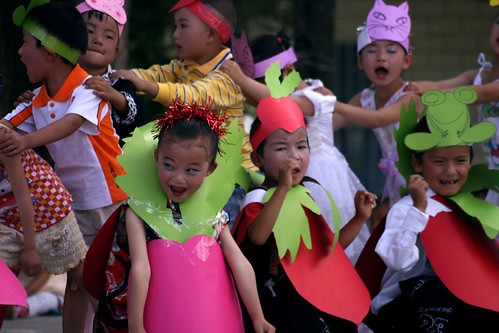 The total distance to Lijiang, where I planned my next longer stop, and also to engage in some trekking, is approximately 180 kilometers, meaning that I physically could have completed the stretch in two days. But I was looking forward to some relaxed cycling and give myself time to thoroughly appreciate the beautiful, mountainous scenery. Therefore, the following day I planned to only pedal 30 kilometers to Heqing, a city only 45 kilometers from Lijiang. About half way I stopped to ask for direction as I have been forced to many times due to the Chinese road sign, or more correctly, the lack of Chinese road signs. I approached a group of men repairing a dusty, old truck ready for the junkyard. When I presented my simple question of directions the men started to argue immediately. An older man was convinced I should travel back one kilometer then take a left, something I was not too keen on. A younger, more aggressive man had another solution. He suggested me to take a right just at the next intersection visible from where we were standing, then slowly turn right, and at last make a sharp left to catch the main road. Both men drew detailed drawings of their recommended routes, and it almost felt like they were competing for my attention. From what I could understand the latter directions was a short-cut and would save me time. On the other hand, it seemed very complicated opposed to the first option. When I hesitated, not sure who I should let down and who I wanted to declare winner, the younger man gestured that he and his wife would show me the way. We traveled down the road, he and his wife on their motorbike, me on my bicycle, and quickly left the main road onto a smaller path leading to a small village. The dirt road was bumpy, filled with pot-holes and full of sand and rocks. Slowly we made our way through the village to enter another one, on small winding roads between mud houses, cows, chickens, children in chock, old men dropping their pipes in astonishment, and when I though we would come to a larger road, we crossed into another village. After five kilometers, and at the point where I felt I could not find my way back, I got anxious and jumped off my bicycle, illustrating that we were going the wrong direction, heading south instead of north. I was starting to wonder what this man and his wife were up to. Where were they taking me? What did they want? The man positively signed that we were almost there, at the bigger road leading to Heqing. I looked him in the eyes, shook his hand and hoped for the best. Two kilometers later he pointed straight ahead. And there it was; Road S212 going to Heqing. I shook his hand once more, gave his wife a big smile and rolled my bicycle over the last bit of dirt road onto perfect tarmac. Back on the big road I realized the magnitude of their kindness. They had taken more than half an hour of their time traveling seven kilometers just to show me a shorter, faster way. I felt truly bad about not trusting them, and thinking of them as bad people.
The total distance to Lijiang, where I planned my next longer stop, and also to engage in some trekking, is approximately 180 kilometers, meaning that I physically could have completed the stretch in two days. But I was looking forward to some relaxed cycling and give myself time to thoroughly appreciate the beautiful, mountainous scenery. Therefore, the following day I planned to only pedal 30 kilometers to Heqing, a city only 45 kilometers from Lijiang. About half way I stopped to ask for direction as I have been forced to many times due to the Chinese road sign, or more correctly, the lack of Chinese road signs. I approached a group of men repairing a dusty, old truck ready for the junkyard. When I presented my simple question of directions the men started to argue immediately. An older man was convinced I should travel back one kilometer then take a left, something I was not too keen on. A younger, more aggressive man had another solution. He suggested me to take a right just at the next intersection visible from where we were standing, then slowly turn right, and at last make a sharp left to catch the main road. Both men drew detailed drawings of their recommended routes, and it almost felt like they were competing for my attention. From what I could understand the latter directions was a short-cut and would save me time. On the other hand, it seemed very complicated opposed to the first option. When I hesitated, not sure who I should let down and who I wanted to declare winner, the younger man gestured that he and his wife would show me the way. We traveled down the road, he and his wife on their motorbike, me on my bicycle, and quickly left the main road onto a smaller path leading to a small village. The dirt road was bumpy, filled with pot-holes and full of sand and rocks. Slowly we made our way through the village to enter another one, on small winding roads between mud houses, cows, chickens, children in chock, old men dropping their pipes in astonishment, and when I though we would come to a larger road, we crossed into another village. After five kilometers, and at the point where I felt I could not find my way back, I got anxious and jumped off my bicycle, illustrating that we were going the wrong direction, heading south instead of north. I was starting to wonder what this man and his wife were up to. Where were they taking me? What did they want? The man positively signed that we were almost there, at the bigger road leading to Heqing. I looked him in the eyes, shook his hand and hoped for the best. Two kilometers later he pointed straight ahead. And there it was; Road S212 going to Heqing. I shook his hand once more, gave his wife a big smile and rolled my bicycle over the last bit of dirt road onto perfect tarmac. Back on the big road I realized the magnitude of their kindness. They had taken more than half an hour of their time traveling seven kilometers just to show me a shorter, faster way. I felt truly bad about not trusting them, and thinking of them as bad people. Lijiang is similar to Dali that it is jammed with Chinese tourists. They are everywhere with their sun umbrellas, cameras, camcorders, matching clothes and flags. They seem to really enjoy being labeled 'tourist' because they strive to live up to it. The old town of Lijiang is also typically constructed in a beautiful traditional Chinese style, and offers equally many souvenir shops. As a result, I will shortly head back out into the wild, despite the beauty of the city. This time, however, I will walk.
Lijiang is similar to Dali that it is jammed with Chinese tourists. They are everywhere with their sun umbrellas, cameras, camcorders, matching clothes and flags. They seem to really enjoy being labeled 'tourist' because they strive to live up to it. The old town of Lijiang is also typically constructed in a beautiful traditional Chinese style, and offers equally many souvenir shops. As a result, I will shortly head back out into the wild, despite the beauty of the city. This time, however, I will walk.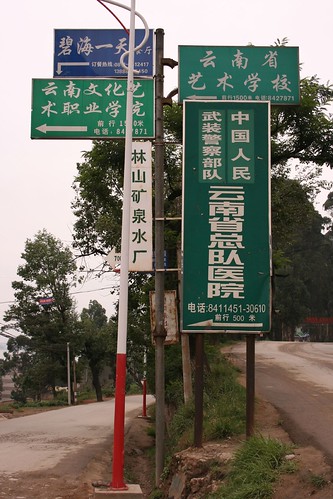
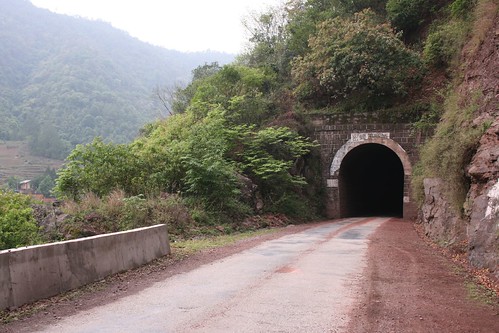 On my way to Chuxiong on my second day towards Dali, I met the second English teacher as I stopped for lunch in a small town, consisting of a dirt road and a tiny market. I was introduced to her mother, who served me a delicious meal from her bicycle. It was a custom made three-wheeler with a kitchen on the back, loaded with several different tasty dishes. This time I paid for the meal myself, but for 3 Yuan (0,30 Euro) I had it covered. After 78 kilometers I arrived in Chuxiong, a large city located roughly half-way between Kunming and Dali, and again I was faced with communication issues as I tried to find a hotel. After my forth attempt I checked in to a hotel on the east side of the city. The odd location forced me to take the bicycle back into town in search for food. Just after I parked the bicycle a man approached me, speaking good English with a hint of a British accent. He, too, was an English teacher and seemed extremely keen on practising his skills. I took the opportunity to ask questions about Chuxiong, and wondered where I could get the best Chinese dumplings in town. He explained that his Chinese name was Ping and his English Pierre, and took me to his favourite restaurant a few minutes away. Ping had spent six month in England which explained his British tone, and was truly a genuine man with the kindest soul in the world. Not only did he treat me to the dumplings and dinner, he also invited me to his home and introduced me to his family. He offered me coffee and presented me with a gift, showed me around town and took me to his school where works. After five hours I was overwhelmed by his hospitality, generosity and kindness. I thanked him and offered the same hospitality if he would ever visit Sweden. We exchanged e-mail addresses and he left me his phone number in case I would get into trouble. I wish this man all the best in the world.
On my way to Chuxiong on my second day towards Dali, I met the second English teacher as I stopped for lunch in a small town, consisting of a dirt road and a tiny market. I was introduced to her mother, who served me a delicious meal from her bicycle. It was a custom made three-wheeler with a kitchen on the back, loaded with several different tasty dishes. This time I paid for the meal myself, but for 3 Yuan (0,30 Euro) I had it covered. After 78 kilometers I arrived in Chuxiong, a large city located roughly half-way between Kunming and Dali, and again I was faced with communication issues as I tried to find a hotel. After my forth attempt I checked in to a hotel on the east side of the city. The odd location forced me to take the bicycle back into town in search for food. Just after I parked the bicycle a man approached me, speaking good English with a hint of a British accent. He, too, was an English teacher and seemed extremely keen on practising his skills. I took the opportunity to ask questions about Chuxiong, and wondered where I could get the best Chinese dumplings in town. He explained that his Chinese name was Ping and his English Pierre, and took me to his favourite restaurant a few minutes away. Ping had spent six month in England which explained his British tone, and was truly a genuine man with the kindest soul in the world. Not only did he treat me to the dumplings and dinner, he also invited me to his home and introduced me to his family. He offered me coffee and presented me with a gift, showed me around town and took me to his school where works. After five hours I was overwhelmed by his hospitality, generosity and kindness. I thanked him and offered the same hospitality if he would ever visit Sweden. We exchanged e-mail addresses and he left me his phone number in case I would get into trouble. I wish this man all the best in the world.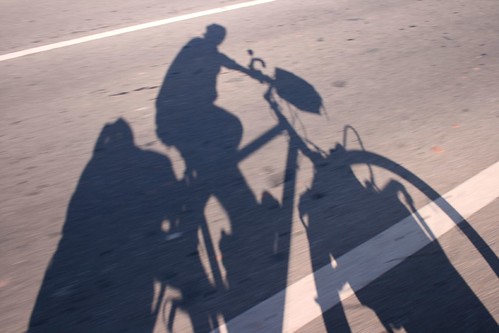 On my last day towards Dali I failed again to accurately estimate the distance, forcing me to break the long distance record, 129 kilometers. This was a long day and I did not find my way to Dali until early evening, having conquered a big mountain pass, bumpy roads, false directions, never ending construction site and the usual heat and sweat. In four days I have pedalled over 400 kilometers, pushing my physics to the limit. Now I am feeling that I am truly becoming stronger, seeing my body taking new shapes. My calves have taken abnormal proportions and despite all the food and snacks I am continuously consuming, I am still losing weight. Dali offers a variety of good foods, so now I am taking the opportunity to indulge in pancakes, fruit shakes, hamburger, cakes, and all the traditional Chinese foods without any guilt at all.
On my last day towards Dali I failed again to accurately estimate the distance, forcing me to break the long distance record, 129 kilometers. This was a long day and I did not find my way to Dali until early evening, having conquered a big mountain pass, bumpy roads, false directions, never ending construction site and the usual heat and sweat. In four days I have pedalled over 400 kilometers, pushing my physics to the limit. Now I am feeling that I am truly becoming stronger, seeing my body taking new shapes. My calves have taken abnormal proportions and despite all the food and snacks I am continuously consuming, I am still losing weight. Dali offers a variety of good foods, so now I am taking the opportunity to indulge in pancakes, fruit shakes, hamburger, cakes, and all the traditional Chinese foods without any guilt at all.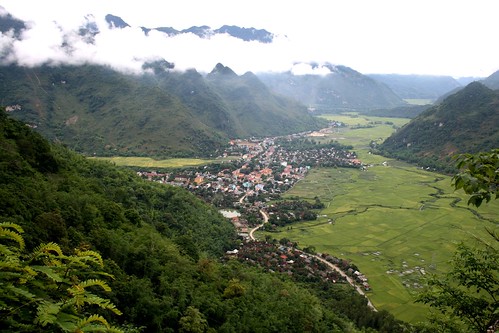 The road to Tuan Giao was expectedly hilly and I crossed one big mountain pass early in the day. Today the major challenge was not the hills or the passes; it was the condition of the road. The entire stretch was under construction, making it difficult to gain speed even when traveling downhill. By the end of the day my bicycle had become so filthy that as soon as I arrived in Tuan Giao I had it washed and polished for an astonishing 5000 Dong (0,30 Euro). From this day on I had my bicycle washed each night for the same price, and each time it would look like it did the day I rolled it out of the bicycle store in Germany where I bought it eight months ago. I was impressed by the bicycle how well it had been performing on the bumpy roads, and that it still was in one piece. Up until this day I have not had a single flat tire, broken spoke or rattling chain. My gear cables have gotten slightly stretched, making it more difficult to adjust the gears but that it is fairly normal and usually easily fixed.
The road to Tuan Giao was expectedly hilly and I crossed one big mountain pass early in the day. Today the major challenge was not the hills or the passes; it was the condition of the road. The entire stretch was under construction, making it difficult to gain speed even when traveling downhill. By the end of the day my bicycle had become so filthy that as soon as I arrived in Tuan Giao I had it washed and polished for an astonishing 5000 Dong (0,30 Euro). From this day on I had my bicycle washed each night for the same price, and each time it would look like it did the day I rolled it out of the bicycle store in Germany where I bought it eight months ago. I was impressed by the bicycle how well it had been performing on the bumpy roads, and that it still was in one piece. Up until this day I have not had a single flat tire, broken spoke or rattling chain. My gear cables have gotten slightly stretched, making it more difficult to adjust the gears but that it is fairly normal and usually easily fixed.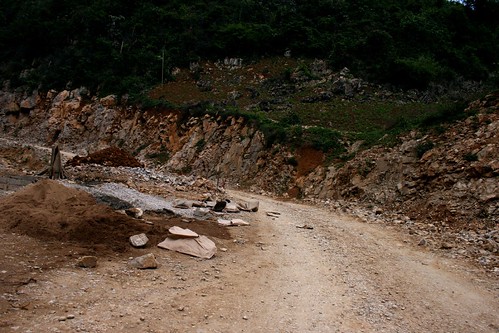 Son La appealed to me. I decided to stay here for one more resting day before pushing it to Hanoi, which would take three more days. I was not up for any sights or museums and looked forward to just relaxing and resting my legs. On my way to Son La through the mountains I had been offered some of sort of alcohol numerous times, most often rice wine, and it seemed like wherever I would sit down to eat, drink or simply rest, I would instantly have a beer or a shot glass in front of me. Most often I politely turned down the offers, repeatedly shaking my head and smile. Son La was no different. On the contrary, here people drank throughout the day. After a visit to the local market and stocking up on my favorite snacks, I sat down to enjoy a cool, refreshing sugarcane juice from one of the smaller restaurants in the center of Son La. Quickly I was surrounded by a five men, six large glasses and a few of liters of “bia”. As this was my day off I accepted their company, we raised our glasses, toasted and after an hour all bottles were empty. The men stood up, nodded, gave me a last smile and went about their business, as if this was part of their daily routine. It certainly seemed like the people of Son La had made a habit of drinking regularly. The same day, at lunch time, a group of policemen in their military green outfits with red and gold details sat down at the table next to me after finishing their midday meal. Again, I was offered alcohol with authority, but I respectfully turned down their offer, hoping that they would not arrest me for not drinking. It did not stop them, and they gladly poured down one shot after the other of rice wine, slamming the glasses hard against the table, shouting and laughing. Then, like the incident earlier in the day, they stood up, nodded and went about their business, driving off in their rusty open-air police van. Great police work, I though to myself.
Son La appealed to me. I decided to stay here for one more resting day before pushing it to Hanoi, which would take three more days. I was not up for any sights or museums and looked forward to just relaxing and resting my legs. On my way to Son La through the mountains I had been offered some of sort of alcohol numerous times, most often rice wine, and it seemed like wherever I would sit down to eat, drink or simply rest, I would instantly have a beer or a shot glass in front of me. Most often I politely turned down the offers, repeatedly shaking my head and smile. Son La was no different. On the contrary, here people drank throughout the day. After a visit to the local market and stocking up on my favorite snacks, I sat down to enjoy a cool, refreshing sugarcane juice from one of the smaller restaurants in the center of Son La. Quickly I was surrounded by a five men, six large glasses and a few of liters of “bia”. As this was my day off I accepted their company, we raised our glasses, toasted and after an hour all bottles were empty. The men stood up, nodded, gave me a last smile and went about their business, as if this was part of their daily routine. It certainly seemed like the people of Son La had made a habit of drinking regularly. The same day, at lunch time, a group of policemen in their military green outfits with red and gold details sat down at the table next to me after finishing their midday meal. Again, I was offered alcohol with authority, but I respectfully turned down their offer, hoping that they would not arrest me for not drinking. It did not stop them, and they gladly poured down one shot after the other of rice wine, slamming the glasses hard against the table, shouting and laughing. Then, like the incident earlier in the day, they stood up, nodded and went about their business, driving off in their rusty open-air police van. Great police work, I though to myself.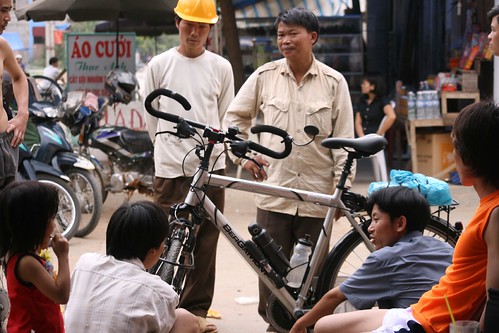 The rain was not going to stop and the last two days it more of less rained constantly. In Son La I had invested in a new poncho which covers me completely as well as most of my bicycle. It came very handy as I pedaled 117 kilometers to Hoa Binh, breaking the long distant record, and on the last day of the north-west Vietnam tour pushed the last 75 kilometers to Hanoi. It had taken me ten days to reach Hanoi from Sapa, cycling eight days, resting two. With the additional two days in Sapa it added up to twelve days, same as planned. Proud I rolled into Hanoi and the first westerner I noticed crossing the street right in front of my bicycle was the Dutch fellow I met before leaving for Sapa, and then also half way to Hanoi on one of the mountain passes. He had cycled the exact same route in the same number of days, but in the reverse direction. We laughed, shared experiences and decided to meet for a beer later that evening. I had a lot to tell and so did he.
The rain was not going to stop and the last two days it more of less rained constantly. In Son La I had invested in a new poncho which covers me completely as well as most of my bicycle. It came very handy as I pedaled 117 kilometers to Hoa Binh, breaking the long distant record, and on the last day of the north-west Vietnam tour pushed the last 75 kilometers to Hanoi. It had taken me ten days to reach Hanoi from Sapa, cycling eight days, resting two. With the additional two days in Sapa it added up to twelve days, same as planned. Proud I rolled into Hanoi and the first westerner I noticed crossing the street right in front of my bicycle was the Dutch fellow I met before leaving for Sapa, and then also half way to Hanoi on one of the mountain passes. He had cycled the exact same route in the same number of days, but in the reverse direction. We laughed, shared experiences and decided to meet for a beer later that evening. I had a lot to tell and so did he. 
